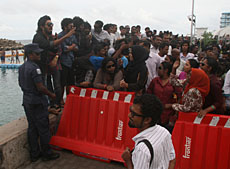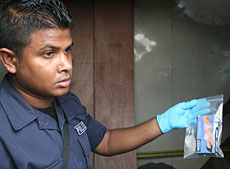There are few individuals who have lost as much goodwill and respect of democrats in as little time as Dr Mohamed Waheed Hassan Manik.
Among them was his own brother Naushad Waheed Hassan, the former Deputy High Commissioner of the Maldives to the UK, who handed in his resignation letter following the February 7 coup d’état. In a statement, he said “…it is with a heavy heart that I have to say that this is indeed an illegitimate government and I cannot be party to it”.
Maldives Ambassador to the United Nations, Abdul Ghafoor Mohamed, resigned live on air on Al Jazeera, citing “moral and ethical concerns” surrounding the transfer of power. Dr Farahanaz Faizal, the Maldivian High Commissioner to the UK, also tendered her resignation, saying: “They robbed the people of the vote and when I saw the brutality of the police… that was the final straw”.
Over 100 days later, tens of thousands continue to march in protest and express contempt for the man who undid the country’s first democracy.
Coercion
It is hardly a matter of debate that what transpired on February 7-8, 2012 was a coup d’état.
Indeed, the then Vice President Mohamed Waheed himself claims to have been watching the events unfold on national television as the country descended into chaos.
TV stations were played harrowing videos of police senselessly beating MDP leaders and supporters unconscious on the streets. We saw dramatic footage of police and military personnel, led by Dr Waheed’s brother, storming into and taking over the headquarters of the state broadcaster, as well as ransacking and destroying the MDP party campus.
Online videos show a former military colonel Mohamed Nazim (later appointed Defence Minister), demanding an ‘unconditional resignation’ from the first democratically elected President in the nation’s history.
An amateur video clip showed the alleged coup leaders holed up in the police headquarters along with a former policeman Abdulla Riyaz (who has since been appointed Commissioner of Police) and current Deputy Commissioner Hussain Waheed (who had earlier denied his presence at the scene), showed them hugging and celebrating. Gasim Ibrahim, the businessman leader of Jumhooree Party, was seen remarking that he was relieved it was over “without involving a military takeover”.
PPM Vice President Umar Naseer – a man renowned for speaking exactly more words than necessary – has publicly revealed the existence of a ‘command centre’ and openly boasted at a party gathering that the President’s life was on the line had he not resigned.
Indeed, Australian television SBS Dateline has aired devastating audio clips of an agitated President Nasheed pleading for the safety of his family in return for his resignation. In yet another leaked audio clip, Waheed’s own advisor, DQP leader Dr Hassan Saeed – has termed it a “unique coup”.
The brazen violence against MDP leaders by the regime forces, the arrest warrants issued against Nasheed less than a day of his ouster, and the subsequently leaked audio and video clips leaves no room for doubt that the first democratically elected President of the Maldives was made to resign under duress – in other words, an unambiguous, clear-cut case of a coup d’état.
There is simply no intellectually honest argument that can be made against this.
What remains to be seen is whether the perpetrators of the coup will face justice for their treason, and whether Maldivians will ever get to learn the finer details of the plot that overthrew their first democratically elected government – of how it was conceived, financed and executed.
Uncovering the facts
Whereas governments like India have spectacularly miscalculated their response to the coup d’état, the Commonwealth Ministerial Action Group (CMAG) and EU have been more forthright about their demands from the newly installed regime – early elections, and an independent inquiry.
In what is essentially Napolean hiring a council of pigs to investigate the affairs at the Farm, Waheed put together a three-member ‘independent’ inquiry commission, two of whom served as Cabinet ministers in Gayoom’s former regime, to “investigate” the coup d’etat.
The Commission for National Inquiry (CNI) came under heavy fire from CMAG, which gave the government four weeks to reconstitute the panel to include international experts and a representative acceptable to the MDP, or face the consequences.
A lot of tantrums were thrown in retaliation, with prominent figures allied with the regime ridiculing the Commonwealth body, going so far as to accuse them of accepting bribes. One MP even introduced a bill in Parliament to withdraw from the Commonwealth.
Another MP, Riyaz Rasheed, offered his enlightened opinion that the UK was not, in fact, a democracy, and proceeded to mock the British Queen as “physically challenged” in a bizarre diatribe that would have earned most people a long vacation in a padded room.
Despite the alternating complaints and swagger, the regime finally relented with just a day left on the deadline and agreed to have a Commonwealth approved co-chair on the Inquiry Commission, and also gave an assurance to CMAG that a member nominated by President Nasheed would be appointed.
However, no sooner did the Commonwealth Special Envoy Sir Don McKinnon board his flight than the regime’s obstructive tactics were back in full force.
The regime rejected all nine names proposed by President Nasheed. Instead, Waheed’s Attorney General Azima Shukoor laid out the “conditions” that needed to be met by the nominees, including the demand that they should not have served in a political position in the past two years, and must not have taken a public position on a matter that has been at the centre and forefront of the national debate for over a 100 days.
And if Nasheed doesn’t find such a candidate in less than two weeks, the regime vows to unilaterally appoint a lawyer to fill the spot.
Rewinding the clock
With the delaying tactics in place, the regime has embarked on a series of steps to try and legitimise the power grab.
The government has already hired London-based PR firm Ruder Finn – for an assignment allegedly worth about US$300,000 – to rebuild their image in major Western countries.
Former Attorney General Dr Hassan Saeed, once employed by Gayoom as the ‘reformist’ mask on the his brutal dictatorship, seems destined to forever keep applying lipstick to hideous pigs.
As Waheed’s ‘advisor’, he has been penning a series of articles in the local media, talking about ideals of democracy and state building – a rather weak and laboured point, coming from someone who continues to play lackey to an unrepentant, brutal dictator who has never faced justice for his three decade-long crimes.
The State TV channel, forcibly renamed ‘TVM’ by the vandals on February 7, continues to be known by its Gayoom-era moniker. Gayoom’s children and close associates have all found high ranking positions in the newly formed regime, which Waheed insists is a “continuation” of the former government.
Every major MDP policy – from decentralisation to regional development – has been either reversed or suspended. Boards have been reconstituted, organizations have been abolished, and even the ministries have been reshuffled to closely resemble their Gayoom-era counterparts.
Meanwhile, in another throwback to the despotic Gayoom era, the Waheed regime has engaged in systematically dismantling all avenues of dissent against his government using a heavy handed campaign of intimidation.
Following President Nasheed’s first public appearance following on the coup d’état on February 8, a massive spontaneous protest was crushed with unprecedented police brutality that drew condemnation from international Human Rights organizations like Amnesty International, as well as the local Police Integrity Commission. The regime-appointed Police Commissioner has announced that he will not investigate the mindless violence perpetrated by the police of those days.
After weeks of demonstrations calling for early elections showed no signs of abating, the regime sent in a cavalcade of military and police vehicles to forcibly evacuate and dismantle the protest site, while also rather conveniently recovering boxes of illegal alcohol once the media was out of sight.
In recent days, the regime has indicated its intention to yet again take over the protesters’ new camp, and also usurp the land from the MDP controlled Male’ City Council.
While he has stalled and delayed elections in any way he could, Waheed has been agile and and moved fast to reward the police service with a record number of promotions and has generously increased their headcount by a further 200 staff. He has also paid out generous lump sum awards for years of “pending” allowances to the military forces, in a move that couldn’t hurt his popularity among the uniformed forces.
Waheed has also appeared to be shoring up his Islamist support, sharing a podium with far right Islamist politicians and businessmen, rallying the ‘mujahideen’ behind him in a fiery jihadi speech delivered on February 24.
Waheed’s strategy of using tried and tested Gayoom formula of employing twin pillars of religious paranoia and military force to prop up the regime is increasingly evident.
It is starkly clear that the present regime threatens to rewind the clock back by a decade, undo every progress the country has made since the democratic struggle began long years ago, and return the country back to the hands of the same tyrant whose clutches we had barely escaped.
Every day that an election is delayed is yet another day that the old monster of despotism spreads its tentacles wider.
If the international community fails to make a firm stand to resuscitate the Maldives’ rapidly failing democracy, and ensure justice for the victims, then it will turn out to be an even bigger body blow to Maldivian democrats’ diminishing hopes than Waheed’s betrayal ever was.
All comment pieces are the sole view of the author and do not reflect the editorial policy of Minivan News. If you would like to write an opinion piece, please send proposals to [email protected]
Likes (0)Dislikes
(0)Dislikes (0)
(0) 

